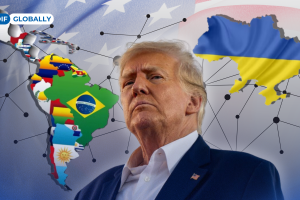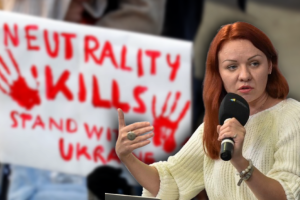Implementation of the Minsk Agreements: “Red Lines” for Ukraine

On ceasefire:
• complete and sustainable ceasefire should be maintained according to clause 1 of the “Package of Measures” during disarmament and withdrawal of troops (clause 2 and 3 of the “Package of Measures”) and until the full restoration of control of the border by Ukraine;
• ceasefire should be observed by the OSCE Monitoring Mission and the Joint Control and Coordination Centre, established within the Trilateral Contact Group.
On disarmament:
• if until the elections military equipment and armaments are kept on Ukraine’s territory in special security storages, those storages should be guarded by the representatives of an international mission with a military component. Only armed observers are able to ensure compliance and not only monitoring of the implementation of security obligations by the parties
On restoration of border control:
• permanent control over the border should be restored before the elections in the occupied territories. As an option, acceptable to the conflict parties, border control should be executed by the OSCE Special monitoring mission (SMM) or to the OSCE mission on the Russian border at “Gukovo” and “Donetsk” checkpoints, following the extension of the latter’s mandate to cover all of the Ukraine-Russia border.
On elections:
• the elections to local government institutions in certain districts of Donetsk and Luhansk regions should be held only within a completely demilitarized territory (after Russian military forces and mercenaries are withdrawn from the territory of Ukraine, and military equipment and armaments are, at a minimum, kept in secured storages on the territory of Ukraine and are in the process of withdrawal from the temporary occupied territories);
• the election date may be cancelled in case of ceasefire violation;
• the elections should be held only after the exchange of prisoners and illegal detainees is completed;
• the elections should be held according to Ukrainian legislation, according to a law adopted by the Verkhovna Rada of Ukraine;
• the law on the elections should not define the election date, but should contain a list of preconditions for the elections, both political (general preconditions for elections defined in the OSCE Copenhagen Document of 1990) and technical (development of an electronic voter register to ensure maximum voting for the internally displaced persons (IDPs), duration and conditions of the election campaign, etc.). The elections should be held only after implementation of the preconditions defined by this law. The political preconditions are the restoration of the basic principles of democratic process; in particular, international observers should confirm freedom of political activity, including freedom of political campaigning and the free functioning of political parties registered in Ukraine (according to the law of Ukraine “On Political Parties”) and non-governmental organizations within the region. Preconditions for the elections should be assessed and approved by a specially established independent election commission including the representatives of the OSCE;
• the right to vote should be granted only to the citizens of Ukraine with appropriate residence registration in Donetsk and Luhansk regions as of April 1, 2014;
• conditions should be created to guarantee the maximum possibility for the internally displaced persons to realize their voting rights;
• running in the elections should be denied to the persons who have committed grave crimes;
• full access to Ukrainian media should be restored at least 2 months before and during the election campaign;
• results of the elections should be determined by the Central Election Commission in accordance with the legislation of Ukraine;
• security during the elections, including along the administrative boundary line, should be provided by an international police force, established with the OSCE participation and under its supervision and control.
On amnesty:
• the law on amnesty for persons connected with the events that occurred in certain districts of Donetsk and Luhansk regions should not contradict the Ukrainian legislation and should not apply to the crimes against humanity and war crimes. Furthermore, the law on amnesty should contain a defined term of validity and the conditions under which the persons that have been already pardoned can be held accountable for other crimes (e.g. in cases of crimes committed outside the time period to which the law on amnesty applies).
On decentralization:
• the implementation of the law on special arrangements of local self-government in certain districts of Donetsk and Luhansk regions should not contradict the constitutional distribution of powers (e.g. law enforcement agencies, judiciary system, etc.)
This list is not intended to be exhaustive and may be expanded in accordance with the political situation.
Signatories:
Institute of World Policy
Ilko Kucheriv Democratic Initiatives Foundation
Ukrainian Center for Independent Political Research
Institute for Euro-Atlantic Cooperation
Donetsk Institute of Information
School for Policy Analysis at NaUKMA (National University of Kyiv-Mohyla Academy)








